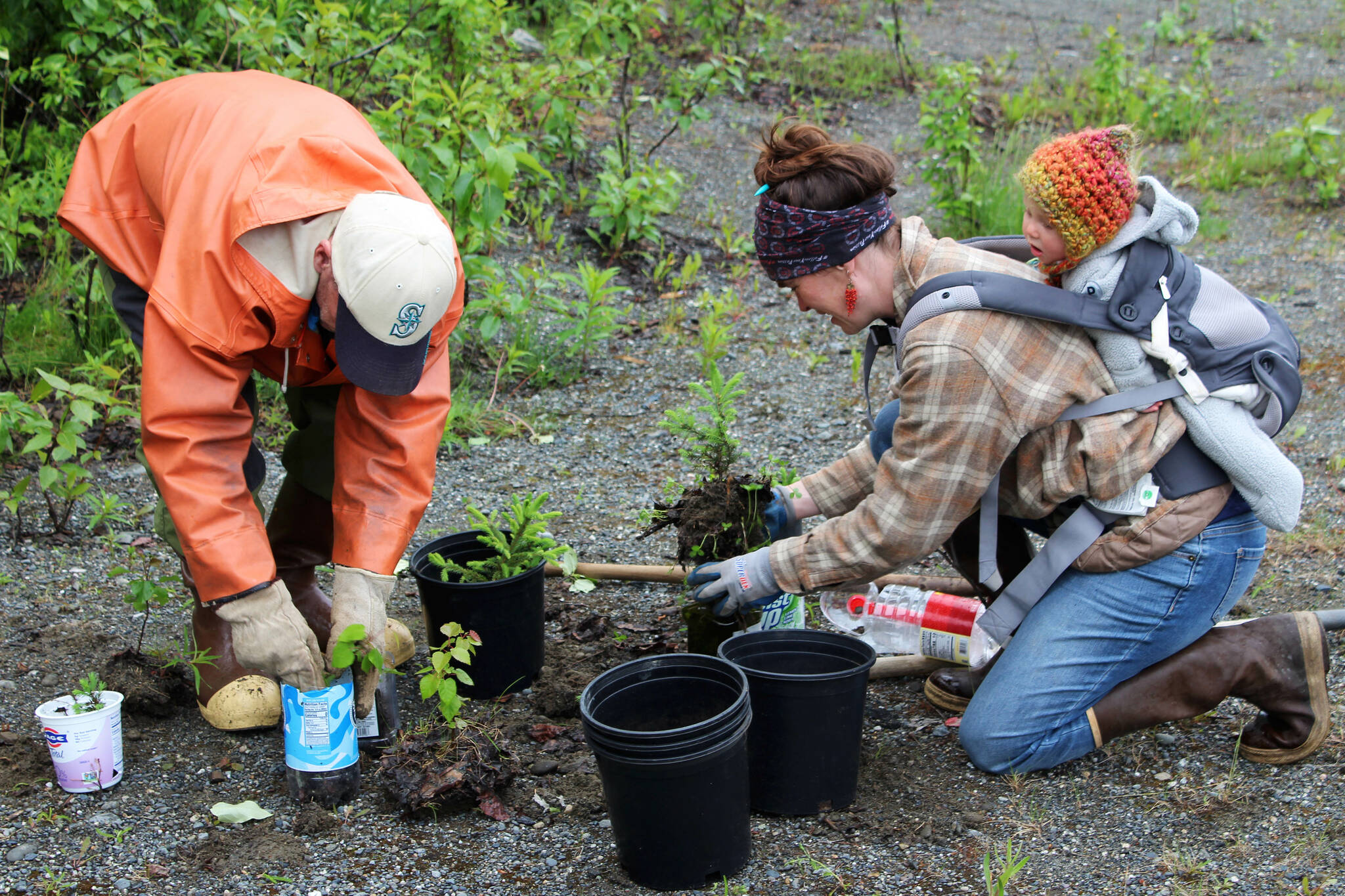From a white truck parked at the Soldotna Regional Sports Complex on Tuesday, David Knight hauled a large bag full of sawed-off plastic containers. Dropping the bag, he turned to the four or five people walking behind him, who held shovels and swatted at mosquitoes under a cloudy sky.
Approaching a small, spiky white spruce sapling, Knight showed volunteers how to dig around the plant in a way that preserves the tree’s root system and how to repot it in one of the plastic containers. The group was congregating in association with Cook Inletkeeper, a local environmental advocacy group, as part of the latest in a series of community-based actions addressing climate change.
“It’s all community-driven,” Knight, who serves as the community engagement coordinator of Cook Inletkeeper, said of the organization’s work.
Tuesday, Knight and others were digging up baby trees — mostly white spruce — with plans to relocate them to one of two free tree stands overseen by Cook Inletkeeper. At the stands, which will be located at Main Street Tap and Grill in Kenai and the Cook Inletkeeper Action Studio in Soldotna, anyone will be able to pick up a tree and instructions on how to help the tree thrive.
A communitywide “re-treeing” project emerged as the top project during a planning session facilitated by Cook Inletkeeper last spring. The organization in 2019 kicked off a “Book to Action Climate Series” with the goal of bringing together central peninsula residents to launch projects that address climate change.
Already, the local action initiatives have established a community composting program that, in its first two years, diverted more than 120,000 pounds of compostable material away from landfills, and made it more affordable for people to bring solar power to their homes through a “Solarize the Kenai” initiative.
Through its re-treeing project, Cook Inletkeeper now has a goal of planting 5,000 trees on the central Kenai Peninsula to restore and enhance tree cover in neighborhoods and public spaces. To make that happen, Cook Inletkeeper Central Peninsula Regional Director Kaitlin Vadla, who was helping repot trees Tuesday with her baby daughter, Skadi, strapped to her back, said the project aims both to plant new trees and relocate at-risk trees.
For Cook Inletkeeper, the benefits of more trees are numerous. Among other things, Vadla said trees help lower air temperatures, reduce air pollution, buffer noises, improve air quality and make an area beautiful.
“For us, they’re like a win-win-win sort of solution,” Vadla said of trees.
Re-treeing has also been identified as a priority of both the City of Kenai and the City of Soldotna, which have successfully removed scores of hazardous, beetle-killed trees from city properties.
The new trees being brought into the area, which for the last six months have been under the care of forester Mitch Michaud, are native to the central peninsula and include spruce and aspen. The re-treeing effort comes as the central peninsula looks more bare than usual, as more residents work to fell hazardous trees killed during the latest spruce bark beetle epidemic.
“There are a lot of folks that are really devastated by losing all of their spruce trees,” Vadla said.
With input from Michaud, Vadla said Cook Inletkeeper isn’t too concerned about including new spruce trees as part of the repotting and planting work. Every type of tree, she said, has an associated pest, and spruce trees go through cycles.
Cook Inletkeeper’s plan is to run the current re-treeing program through October, as fall is the best time for tree planting. Vadla said they’ve already given out about 1,000 trees through a booth at Kenai River Festival, and that more summer outreach events are planned in addition to the free tree stands in Kenai and Soldotna.
Both Knight and Vadla emphasized the impact of communities coming together to solve problems that seem too big for any one person to tackle alone.
“When we do them all together at the community level, we can see the big impact we have,” Vadla said of Cook Inletkeeper’s various initiatives.
More information about “Project Re-Tree” can be found on Cook Inletkeeper’s local solutions webpage at inletkeeper.org/localsolutions. People interested in getting involved with “Project Re-Tree” can contact David Knight at david@inletkeeper.org.
Reach reporter Ashlyn O’Hara at ashlyn.ohara@peninsulaclarion.com.

